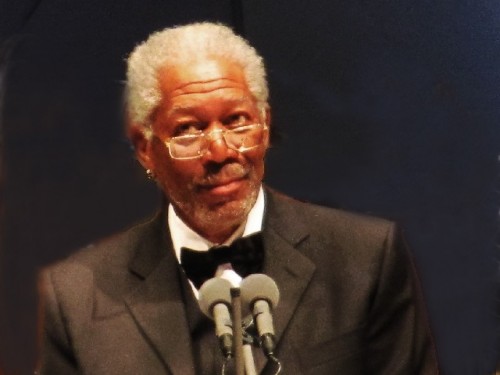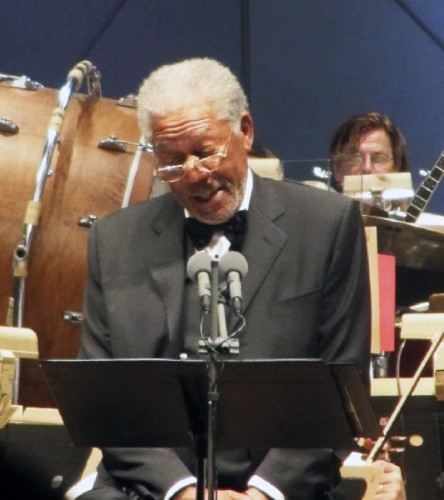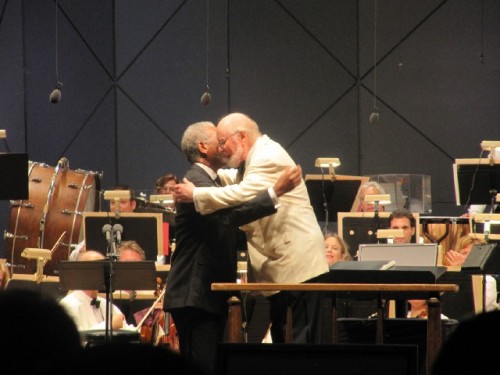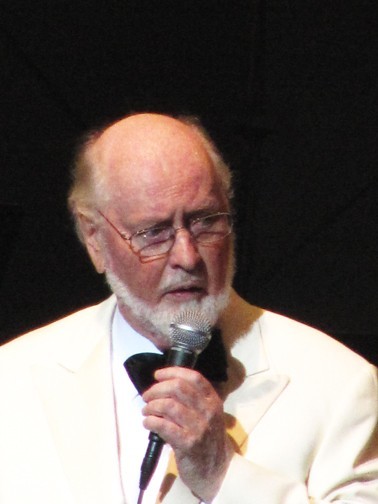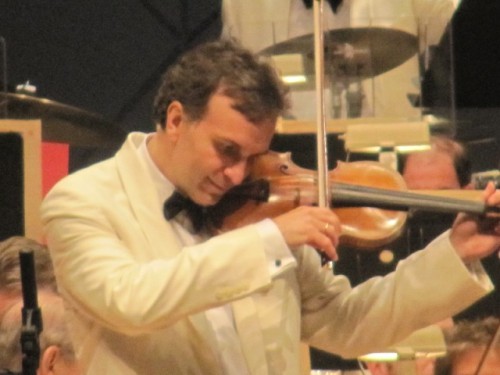Morgan Freeman Joins John Williams for Film Night
Capacity Audience at Tanglewood
By: Charles Giuliano - Aug 21, 2011
Film Night
John Williams Conducting
Boston Pops Orchestra
Morgan Freeman, Narrator
Gil Shaham, Violin
Tanglewood
August, 20, 2011
Program
Whiting, (Williams arrangement) Horray for Hollywood
A Salute to the Hollywood Western
Williams, “The Cowboys”
Barry, John Dunbar’s Theme from “Dances with Wolves”
Newman, Theme from “How the West Was Won”
Williams, Suite from “The Reivers” Narrated by Morgan Freeman
Williams, Tribute to the Film Composer
Presenting Gil Shaham
Gardel (Williams), “Por Una Cabeza” (Tango from “Scent of a Woman”)
Williams, Three pieces from “Schindler’s List”
Bock (Williams) Excerpts from “Fiddler on the Roof”
Williams, (Encore with Shaham) Tribute to Audrey Hepburn
Williams, Throne Room and Finale from “Star Wars”
The Shed was packed and the lawn was occupied as far as the eye could see with a capacity turn out for John Williams conducting the Boston Pops Orchestra during the annual Film Night. It is one of the most anticipated concerts of the season and the weather cooperated with a clear, cool and perfect evening.
For the program Williams, who holds the most Oscars for his film scores, invites special guests. On this occasion he was joined by the actor Morgan Freeman who read from William Faulkner’s last novel, The Reivers, 1962. It won the Pulitzer Prize for fiction in 1963. After intermission the featured soloist was violinist Gil Shaham.
To set the proper mood, yet again, the evening began with a montage of classic films set to the lively score “Horray for Hollywood.”
In the past Williams has created a theme for the concert. One memorable year focused on the films of Warner Brothers, another those of Steven Spielberg during which he was a surprise guest.
Thematically, the program seemed less focused this time and more of an eclectic collage of elements. Perhaps Williams and Tanglewood, as is the case with its most popular presentations, have gone to the well too many times. Add to that the appearances by Williams and the Pops, as well as Tanglewood On Parade.
Bottom line. How many times can you hear a medley from Star Wars? Yet again it closed the program last night. But the plaintive argument of a critic was clearly subsumed by that capacity audience of some 18,000 cheering enthusiastically.
More of a vignette than a unifying theme there was a fun sequence in tribute to Hollywood Westerns. The accompanying film clips were a hoot. We saw multiple treatments of bar brawls and shootouts. There was a sameness to several good guys strolling side by side down dusty main streets in frontier towns. Their hands poised near six shooters ready to gun down the bad guys. It was interesting to see an image from The Great Train Robbery (1903): Produced by Thomas Edison but directed and filmed by Edison Company employee Edwin S. Porter. The Great Train Robbery was the first narrative movie, one that told a story.
The special appeal of film night is the confluence of clips and the magnificent music of Williams conducting a live orchestra.
While introducing Freeman, Williams stated that he wrote the score for the 1969 film The Reivers directed by Mark Rydell and starring Steve McQueen as Boon Hogganbeck. He asked how many of us had seen the film? There was a spattering of applause. Then added that it starred Steve McQueen. For which there was more applause.
Perhaps we can order it on Netflix.
While Williams conducted the score, with that signature voice, one of the most remarkable and familiar of his generation, using reading glasses Freeman read from the endearing Faulkner tale. It richly conveyed the adventure of a boy, Lucius Priest, who tags along when Boon, a family employee, steals, or Reivers, his grandfather’s car. It is the early era of the automobile and the vehicle was the first in Yoknapatawhpa County. Boon just hopes to “borrow” the car to visit a girlfriend in Memphis.
When they arrive the boy discovers that they will be staying in a boarding house “just for girls.” Lucius doesn’t quite know what that means. But there will be quite a learning curve over the next couple of days. Including his first beer, which he liked. And a stint as a jockey for an improbable horse race. In addition to Boon and Lucius there is also a black man, Ned, who works with Boon on the horse farm of the grandfather of Lucius. During the night Ned has swapped the car for a racehorse. There will be a match race to get the car back as a part of a wager.
Lucius is riding a fast horse that likes to follow the pack. But the jockey has somehow enticed him into an uncharacteristic and winning burst of speed. There are other twists and turns as the audience delighted in the reading by Freeman. It was a wonderful treat for a special evening.
For the second part of the program Williams was joined by Shaham. After a steamy rendering of the sensual tango from Scent of a Woman they performed a suite of three pieces from Schindler’s List. Then excerpts from Fiddler on the Roof. It served as a preview of the musical which will open the 2012 season for Barrington Stage Company.
Although that concluded the collaborations with Shaham that were printed in the program, Williams prepared a surprise encore. The violinist returned for a clip of films by the exquisite Audrey Hepburn.
Then, of course, the evening closed with images and excerpts from the series of Star Wars films.
Star Wars is an American epic space opera film series conceived by George Lucas. The first film in the series was originally released on May 25, 1977, under the title Star Wars, by 20th Century Fox, followed by two sequels, released at three-year intervals. Sixteen years after the release of the trilogy's final film, the first in a new prequel trilogy of films was released, again at three-year intervals, with the final film released on May 19, 2005.
As of 2008, the overall box office revenue generated by the six Star Wars films has totaled approximately $4.41 billion,[1] making it the third-highest-grossing film series behind only the Harry Potter and James Bond films.
The clips that Williams accompanied included stills from all of the recording sessions. In this series Lucas always sat in. So there is a kind of time lapse sequence of the director and composer growing older together. As Astrid noted, all of these recording sessions occurred during Februaries. Odd.
Perhaps that will one day be a question on Jeopardy.
During curtain calls we made a fast break for the parking lot and missed the traffic jam which must have been brutal.

